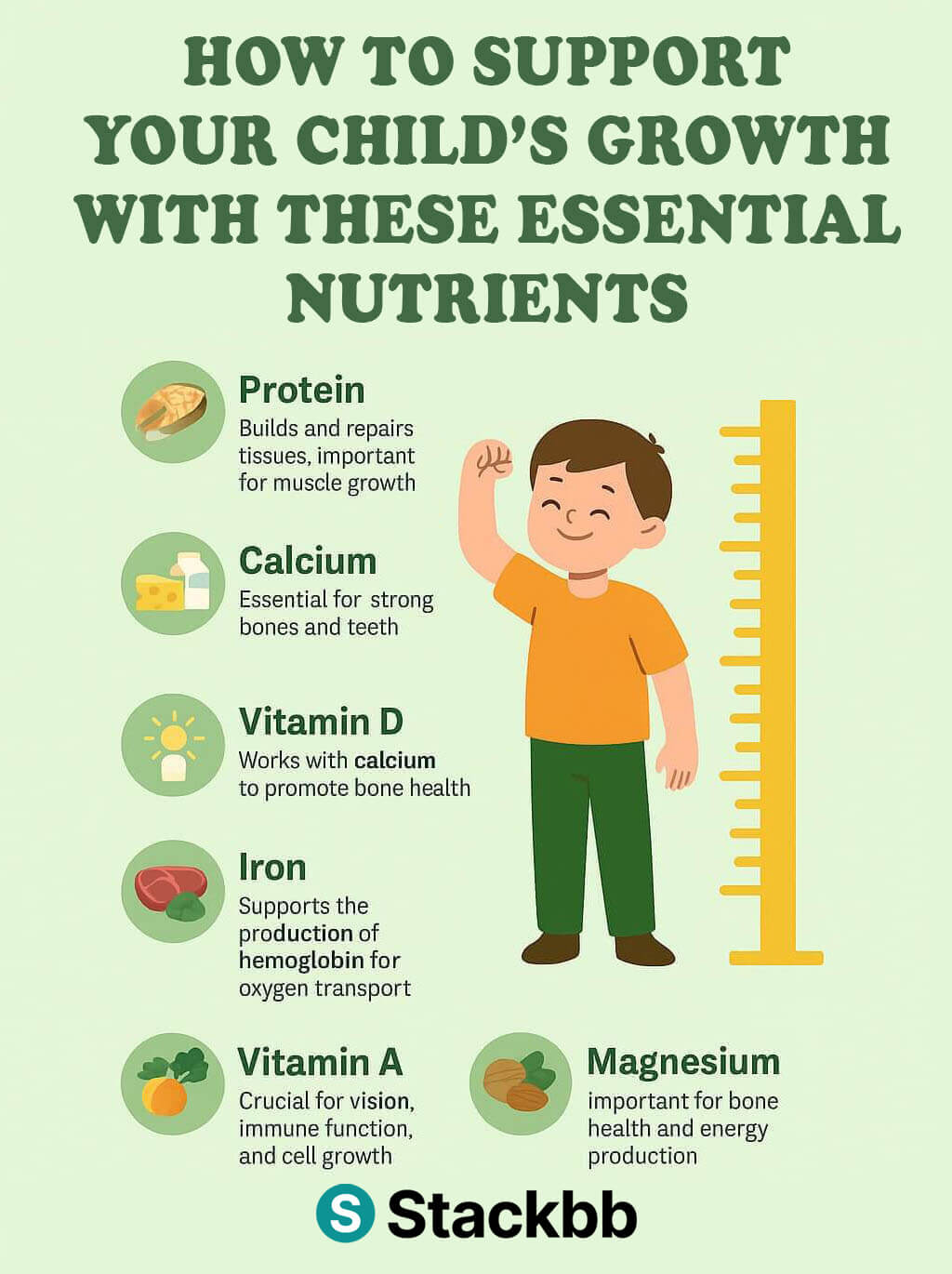
How to Support Your Child’s Growth With These Essential Nutrients

Watching your child grow is one of the greatest joys of parenting. Every inch they gain in height, every leap in energy or learning, it’s a sign they’re thriving. But behind all that growth is something very basic yet powerful: nutrition. The right nutrients at the right time can support your child’s body and brain as they develop, giving them a solid foundation for lifelong health.
In this article, we’ll walk you through the essential nutrients kids need for healthy growth and how you can easily incorporate them into everyday meals. No fuss, no stress!
Why Nutrition Matters in Childhood Growth
Children grow fast, especially during certain developmental spurts. This means their bodies need a steady supply of nutrients to build bones, develop muscles, fuel their brains, and keep their immune systems strong. Poor nutrition during these key phases can result in slower growth, fatigue, learning difficulties, and weaker immune defenses.
Think of nutrition as the building blocks of your child’s future. When those blocks are strong and consistent, everything else stands taller and sturdier: physically, mentally, and emotionally.
9 Essential Nutrients to Fuel Healthy Growth
Visual Summary: Here’s a quick infographic that highlights the key nutrients your child needs, and where to find them.

Protein
Protein is the superstar of growth. It helps build muscles, organs, skin, and even the enzymes that keep everything working smoothly. Children need protein daily to support constant tissue repair and development. Great sources include eggs, chicken, turkey, dairy products, beans, lentils, and tofu.
Calcium
Growing bones are like sponges for calcium. They absorb as much as they can during childhood. This mineral is critical for building strong bones and teeth. Offer milk, yogurt, cheese, broccoli, and fortified plant-based milks regularly to boost calcium intake.
Vitamin D3
Vitamin D3 is calcium’s best friend. It helps the body absorb calcium properly and also supports the immune system. While sunshine helps us make vitamin D3 naturally, kids often need more through foods like fortified dairy, eggs, and fatty fish like salmon or sardines.
Iron
Iron is vital for carrying oxygen throughout the body and fueling brain development. Low iron can lead to fatigue and difficulty concentrating. Look for iron in red meat, chicken, spinach, beans, and iron-fortified cereals.
Zinc
Zinc supports cell growth and repair, making it a quiet but powerful ally during growth spurts. It also plays a role in immune function and wound healing. You’ll find zinc in meat, shellfish, seeds, nuts, and whole grains.
Omega-3 Fatty Acids
These healthy fats (especially DHA and EPA) are essential for brain and eye development. Omega-3 also support mood and memory, perfect for growing minds. Serve fatty fish (like salmon or mackerel), chia seeds, flaxseed, or walnuts regularly to keep those neurons happy.
Vitamin C
Vitamin C helps build collagen, which keeps skin, bones, and blood vessels healthy. It also boosts iron absorption and supports immunity. Offer citrus fruits, strawberries, bell peppers, and kiwi for a fresh dose of C.
B Vitamins
B vitamins, especially B12 and folate, help convert food into energy and create new cells. They’re crucial for growth and energy metabolism. Eggs, dairy, whole grains, meat, and leafy greens are all solid sources.
Magnesium
Magnesium is an underrated mineral that supports bone health, nerve function, and even sleep quality. Many kids don’t get enough! Add magnesium-rich foods like almonds, pumpkin seeds, spinach, bananas, and whole grains to their plate.
Simple Ways to Add These Nutrients to Your Child’s Diet
Now that you know which nutrients matter, here are some realistic (and fun!) ways to include them in your child’s meals:
- Start the day with a smoothie: blend yogurt, banana, spinach, and chia seeds.
- Make meals colorful: include at least 3 colors on the plate to ensure variety.
- Use nut butters or hummus as dips for fruit or veggie snacks.
- Try fun bento-style lunchboxes with cheese cubes, boiled eggs, and fruit slices.
- Let kids help cook, they’re more likely to eat what they help prepare.
What About Supplements?
Supplements can be helpful for picky eaters or kids with specific dietary restrictions, but they shouldn’t replace whole foods. If you’re worried your child isn’t getting enough of something (like iron or vitamin D), talk to your pediatrician before starting any supplements.
A balanced multivitamin can be a good safety net, but real food should always be the priority.
Final Thoughts
Supporting your child’s growth doesn’t have to be complicated. With a little planning and a focus on nutrient-rich foods, you’re giving them the best chance to grow strong, smart, and healthy. Start with small changes, keep it fun, and remember: Every bite counts toward building a brighter future.
This article was originally published on Stackbb, your trusted source for science-based supplement guides.






